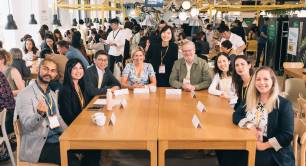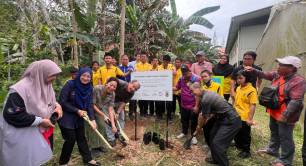‘We are already the super intelligence we are looking for’: Audrey Tang and others’ big ideas for a better future at SEWF25
Why small-scale AI could answer technology’s ethical conundrum, how ‘data sovereignty’ gives Indigenous people new control, finding meaning and joy in old age – and more: the big ideas we brought home from the Social Enterprise World Forum 2025.
“Shùwèi”, in Taiwan, means both “plural” as well as “digital”, explains Audrey Tang. This double meaning neatly draws together the world view of the Taiwanese ambassador-at-large, former minister of digital affairs, and campaigner for the coexistence of technology and democracy.
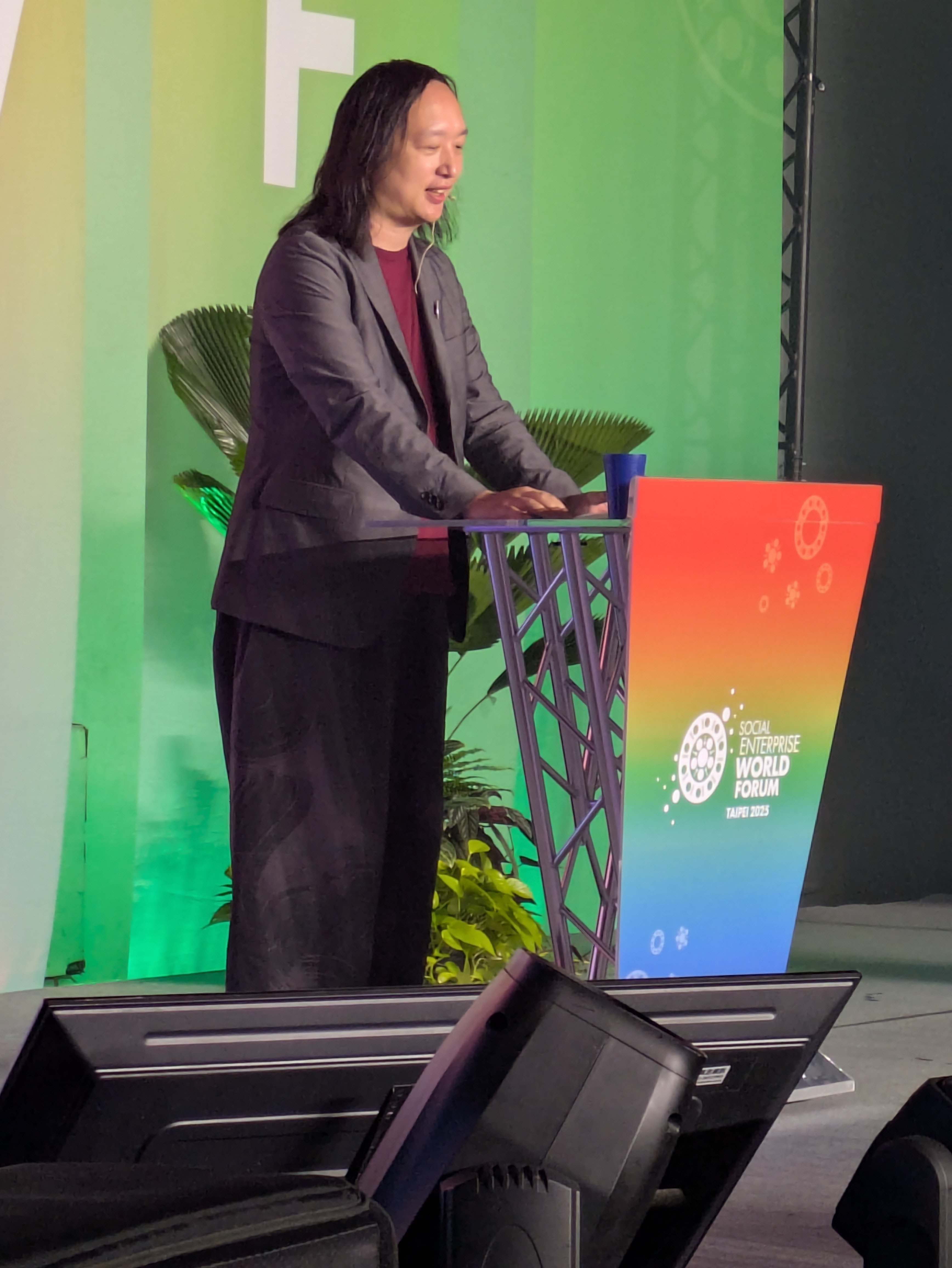
Tang’s lens on the world combines super cutting-edge technological innovation and self-styled “conservative Taoism”, through which she champions civic empowerment, collaboration across political and cultural divides and radical transparency. She is staunchly opposed to top-down, coercive control, by governments, corporates or any other entity.
Speaking to Pioneers Post at the Social Enterprise World Forum 2025 (SEWF25), held last week in Taipei, Tang (pictured) explained how social enterprise, at its best, embodies a pluralistic ethos as opposed to the utilitarianism of big tech and the global corporate giants.
She said: “Communities, not individuals, form society’s backbone. The relationship between a community – relational health, is the indicator of civic care, not one particular small account of one individual.”
Tang’s keynote speech to close SEWF25 was a tour de force of politics, philosophy and (of course) tech ethics, applied to the models and strategies of social enterprise. But, with the event bringing together more than 1,000 delegates from 65 countries, Tang’s speech was far from the only source of innovative ideas and insights shared across the week. Here are five more that grabbed Pioneers Post’s attention.
1. How social enterprises are tapping into the potential of ‘super-aged societies’
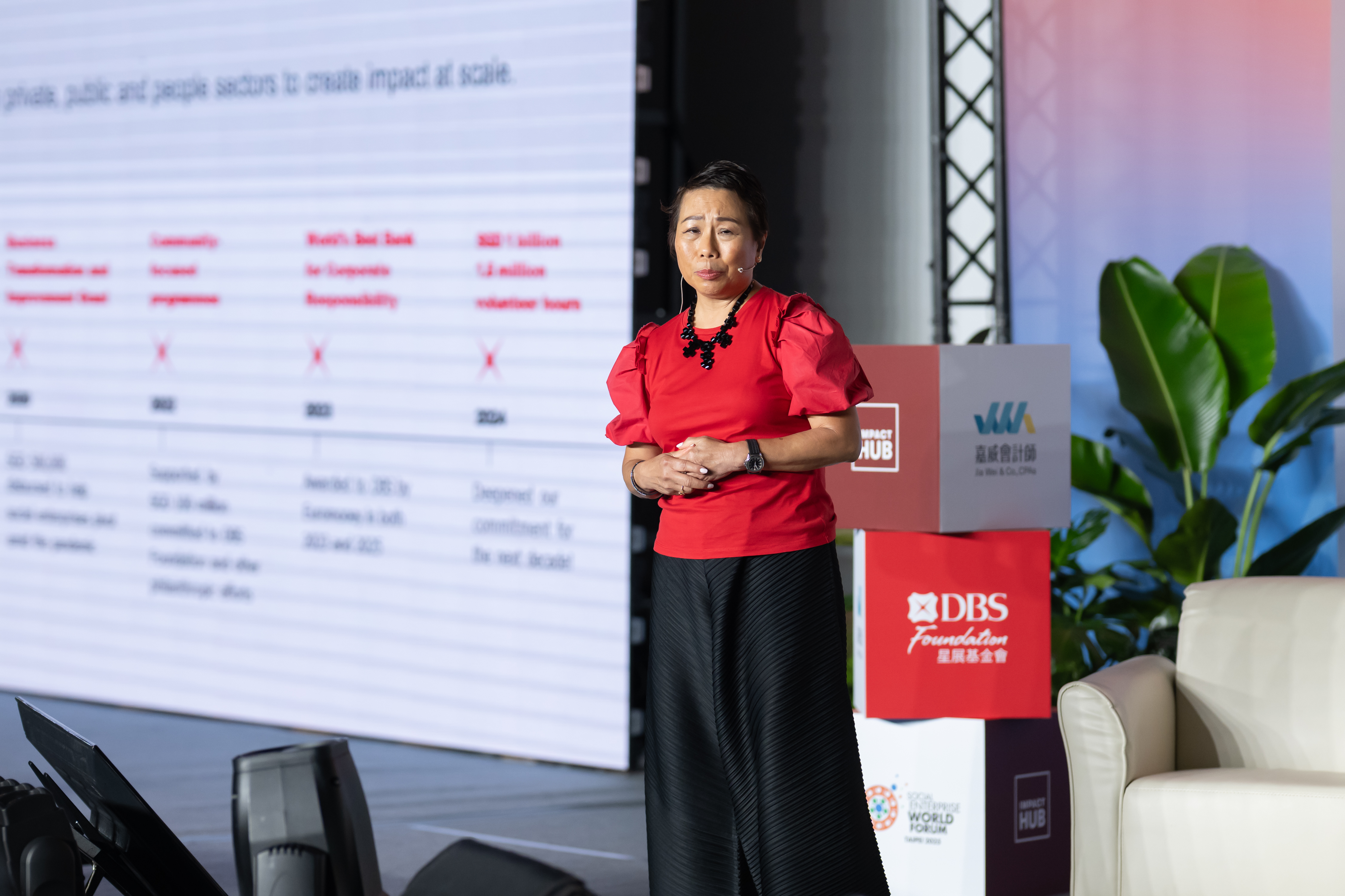
One in four people in Taiwan is aged over 65, with that figure projected to rise to two in five by 2040. That ratio qualifies the country as what the UN brands a “super-aged society”.
Among the many challenges facing super-aged societies are shrinking workforces, ballooning healthcare costs and a rising dependency ratio. Taiwan is far from alone in this predicament. Other super-aged societies include Canada, Germany and Japan, with some predicting there will be more than 40 countries in this category by the end of 2025.
Hosting a panel at SEWF25 on how social enterprises are supporting ageing populations, Karen Ngui (pictured above), head of the DBS Foundation, argued: “There is actually a lot of potential in ageing societies. There are a lot of ways in which we can tap into the longevity dividend.” She added societies need to care for the physical, mental, social and financial health of their older members.
Panelist Chul-ho Shin shared his experiences as CEO of South Korean recruitment social enterprise Sangsangwoori, which matches retirees still wanting to work with employers. Shin explained that South Korea’s rapidly growing social enterprise sector was a place where retirees’ experience and qualifications could add significant value to start-ups.
Shin’s fellow panelist Abdul R Shiil explained how the social enterprise he co-founded, Sahan Cares, had delivered £8.3m-worth of social value across two distinct beneficiary groups since it was founded in 2012.
Sahan Cares trains refugees in the UK in English language, supports them to gain a qualification in social care, then provides staff to hospitals and local authorities in settings working with older people. Shiil, who came to the UK as a refugee from Somalia, said the average staff retention rate in the UK’s care sector was about 27%, but Sahan Cares’ was over 90%, “because when you say ‘yes’ to a community which is often used to hearing ‘noes’, they stay with you for life”.
When you say ‘yes’ to a community which is often used to hearing ‘noes’, they stay with you for life
Hsin-Ling Tsai is founder of Taiwanese social enterprise Silver Linings Global, which develops solutions for ageing societies by building partnerships, organising programmes and promoting innovation in areas like healthcare and technology for older adults. She told the audience that ageing populations were an opportunity for all generations to think differently about older age.
She said: “Ageing is not a decline. It should be about designing a new meaning and joy at every age. So it’s very important that we actually create a space where old-aged people feel comfortable to join the conversation and to share what each of them envisions long life should look like.”
2. Boosting responsible tourism through social enterprise
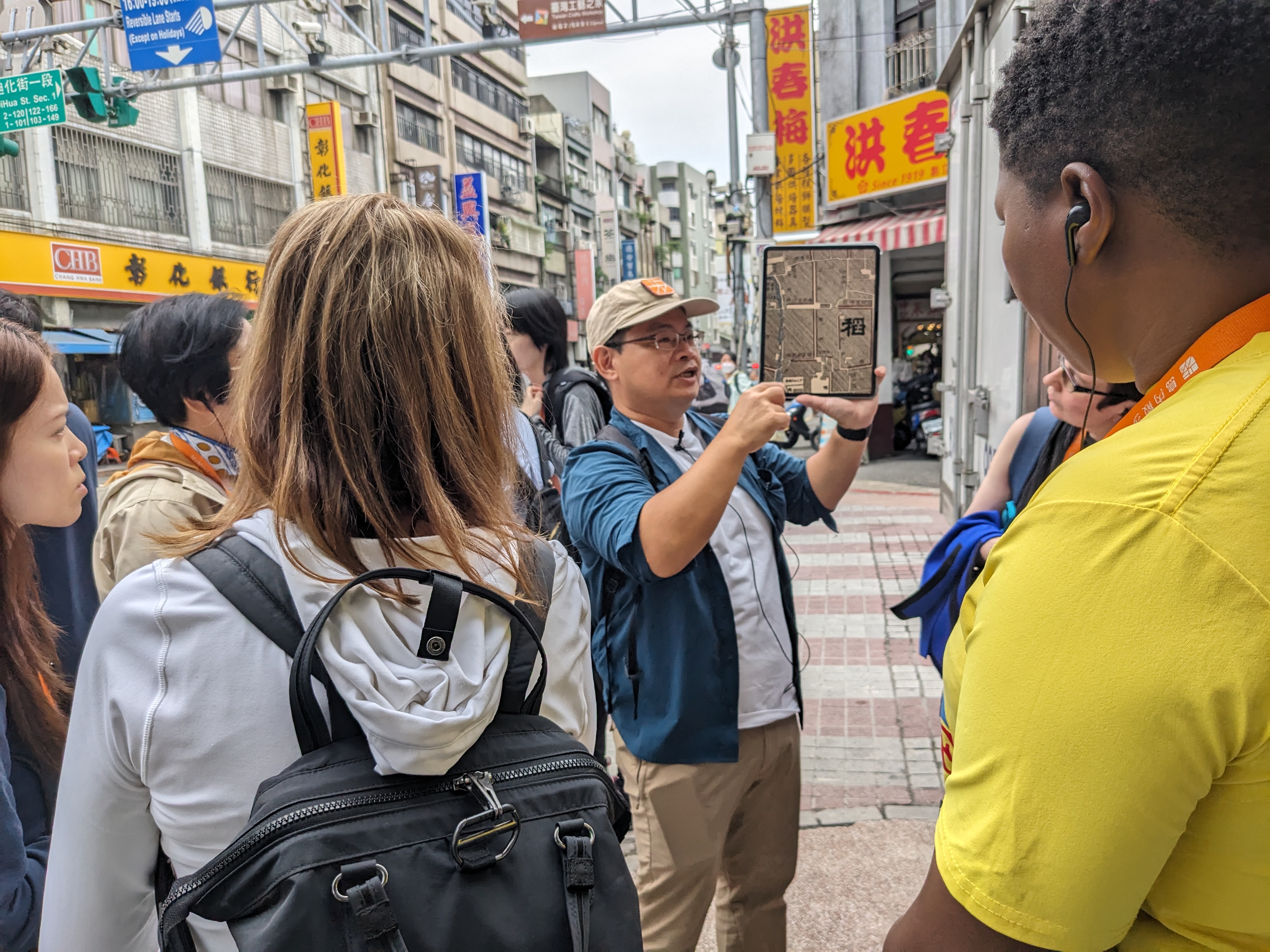
Dadaocheng is the oldest district of Taipei, and a hotspot for social enterprises. During a tour of the area, run by social enterprise Walk in Taiwan, guide Bob Chen explained that the Covid-19 pandemic caused many local businesses which relied on tourism to close.
Social enterprises stepped up to plug the gap, taking the opportunity of low-rent spaces in the tourist-friendly area to open up shops, cafes and more. Chen said these social enterprises have brought innovation to a very traditional area, as well as in many cases reinvesting their profits to serve the local community.
Social enterprises the SEWF25 tour visited included art, fabric and culture shop InBlooom, Okogreen cafe, sustainable clothes shop Story Wear and theatre company Against the Winds, which supports young people who are not in the formal education system. All these were within one square kilometre of each other and were far from the only social enterprises in that neighbourhood.
- Read about Invisible Cities, a social enterprise walking tour that began in Edinburgh and which now operates internationally: Taking a walk on the social enterprise side
Chen, who grew up in Dadaocheng, said: “We are still finding a way to survive here and try to encourage tourists to understand, to share our visions.”
Walk in Taiwan supports this ecosystem by bringing Taiwanese and international walking groups to social enterprises in the area and encouraging them to contribute to the local economy. The organisation avoids areas struggling with over-tourism and, unlike commercial tours, delivers local knowledge to visitors through headphones, rather than over disruptive portable speakers.
3. Move over Monopoly — B Lab the board game is here
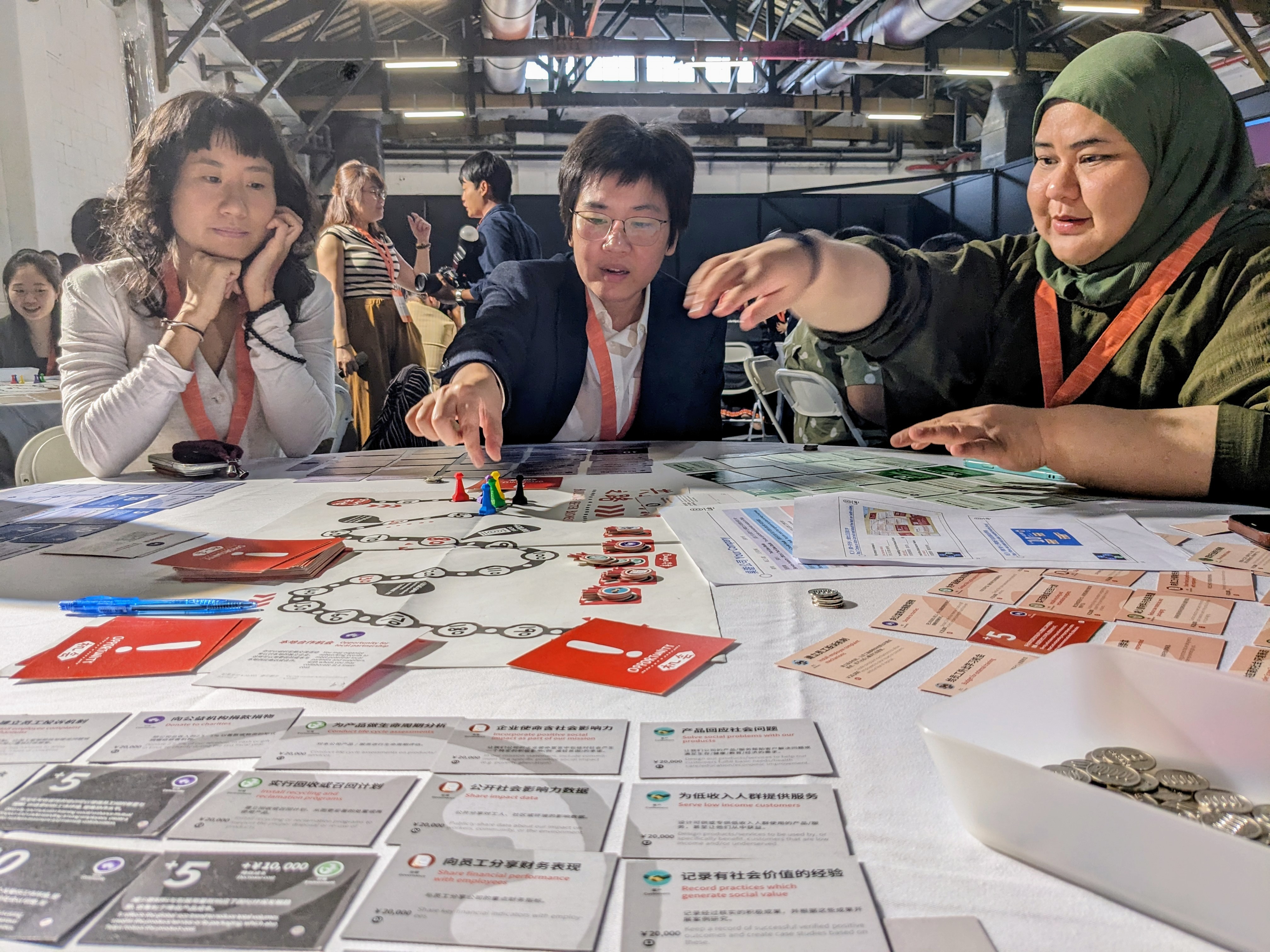 SEWF delegates play Building Better Businesses, a board game developed by B Lab Taiwan
SEWF delegates play Building Better Businesses, a board game developed by B Lab TaiwanIt was standing room-only at a workshop where delegates got to play Building Better Businesses, a board game developed by B Lab Taiwan.
The game involves players taking control of impact businesses in different sectors, including cosmetics, agriculture and eco-friendly packaging. Players then take turns to make business development decisions out of 25 options, for example, “hire underrepresented groups”, “monitor and reduce energy use” or “share impact data”. The options are categorised by the “B Impact Assessment” (BIA) areas.
Each action has an associated investment cost and points reward. Opportunity cards can award players further points, money for future investment or business developments and often encourage collaboration between players to scale impact. An eventual winner is decided based on points scored, money earned and their BIA ranking.
After playing one round of the game, Dorothy Lam, founder of Hong Kong social enterprise network Dream Impact, said the difficult choices demanded by the game were reflective of the real dilemmas social enterprises faced.
“It’s always this dance between profit and purpose. I think making impactful decisions can be challenging, because you are pressed by your top line and your clients. In that kind of environment, can you still make those impactful decisions and still invest with a longer term view? It is a challenge, I would say, but it’s always food for reflection,” she said.
B Lab Taiwan designed the game as an introduction to the B Lab assessment , and it is currently being redesigned to reflect the new standards. Companies, universities and schools are charged a small fee to use the game as an educational tool.
- Read more: B Corp launches new standards as ‘complete reimagining’ of certification of businesses for good
4. ‘Data sovereignty’ is a key to empowering Indigenous communities
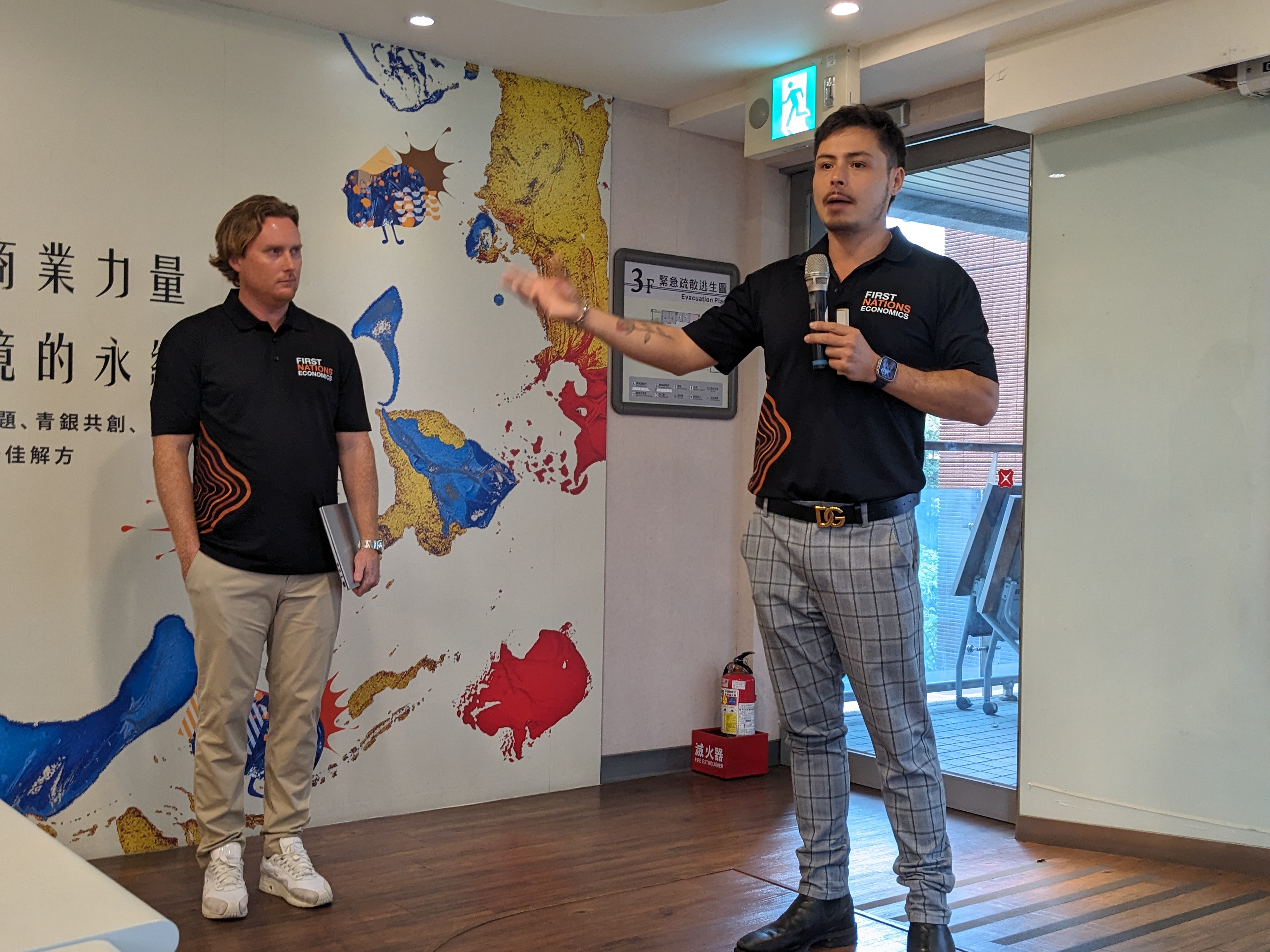 From left: Shaun Cumming and Rick Macourt from First Nations Economics at the SEWF 2025
From left: Shaun Cumming and Rick Macourt from First Nations Economics at the SEWF 2025Anyone who has been to conferences about social enterprise, impact investing or related fields will have heard speeches and panel discussions about empowering Indigenous communities. No doubt these sessions are well-intentioned, but too often they re-tread old ground. And, as Pioneers Post heard from representatives of Indigenous groups at the Latimpacto conference in Mexico last year, often the good intentions are not followed through.
At SEWF25, First Nations Economics, an Aboriginal Australian social enterprise consultancy, shook things up by bringing a new concept to that discourse: data sovereignty.
First Nations Economics carries out projects including monitoring and evaluation, building strategies, and financial analysis with Indigenous groups, on behalf of government and corporate clients.
But First Nations Economics holds all data collected for its work for the duration of the project before handing it over to the relevant Indigenous community once the work is completed. If necessary, First Nations Economics will carry out capacity building with the community so members can use the data for their own decision-making purposes. First Nations Economics’ clients never hold any of the communities’ data.
Speaking at an SEWF25 fringe event, Rick Macourt, managing director of strategy and foundation at First Nations Economics and a member of the Gumbaynggirr Aboriginal nation, explained why he believes data sovereignty is the key to empowering Indigenous communities.
“When a government makes a decision about money, they do so based on evidence, and often evidence is collected about communities instead of with communities. When you’re able to collect evidence, you’re able to create power and that evidence then becomes your argument to create and change,” he said.
If you are able to help Indigenous people gain sovereignty over their own information, you’re able to create power that shifts change
“If Indigenous people don’t have autonomy over the information that is collected about them and used on their behalf, then we will never have an opportunity to influence power. We believe that if you are able to help Indigenous people gain sovereignty over their own information, you’re able to create power that shifts change.”
This approach to data received wholehearted support from Audrey Tang, who told Pioneers Post society needed to undergo a paradigm switch with regards to tech. She said: “Instead of bringing personal data to compute, we need to bring the code to where the data is.”
5. Moving from ‘artificial’ (or ‘addictive’) intelligence to ‘assistive intelligence’
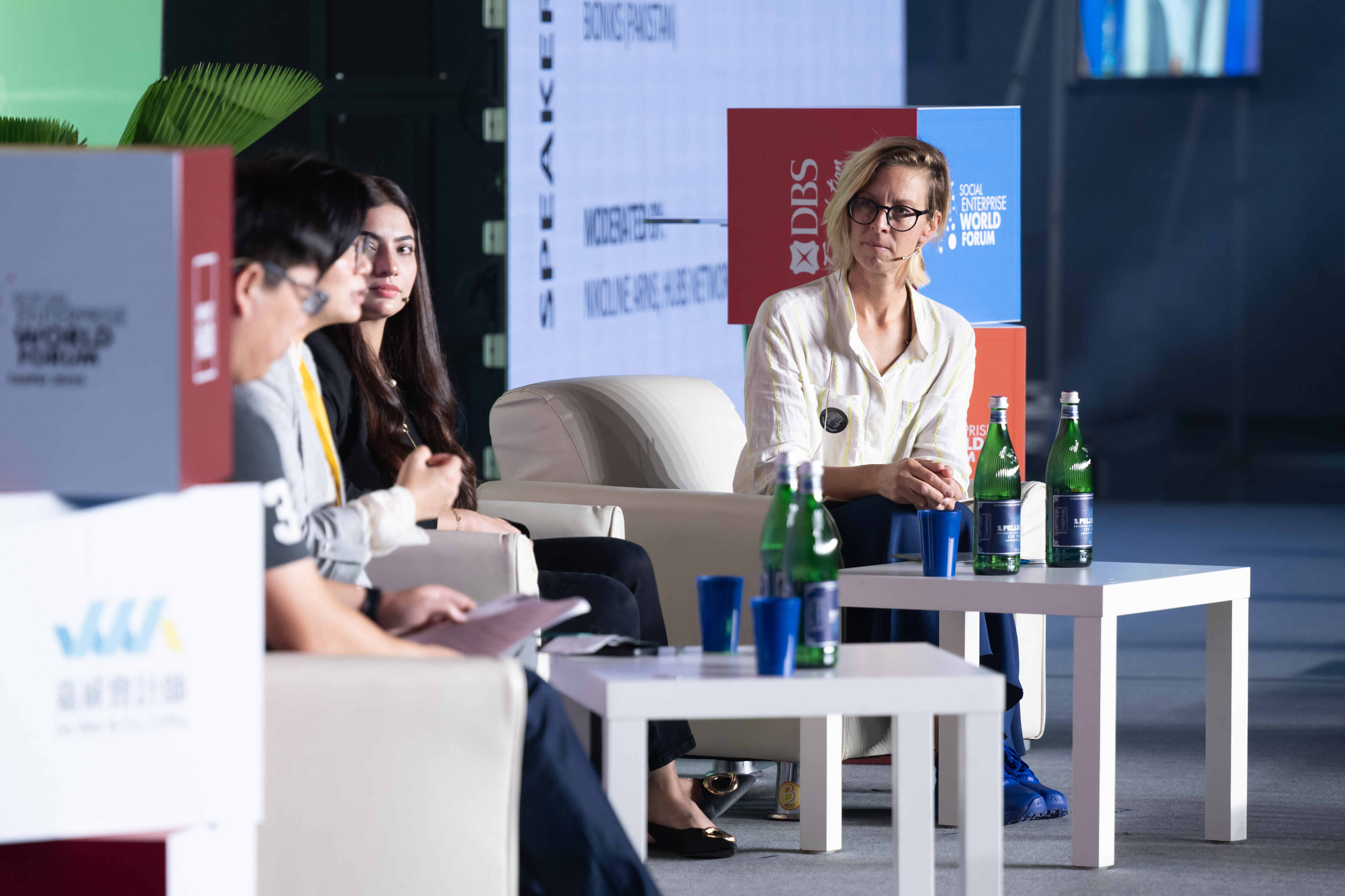
First Nation’s Economics’ data sovereignty concept was just one example of the central role discussions focused on tech played at SEWF25. AI, in particular, was right at the top of many delegates’ agendas.
Many delegates told Pioneers Post they could see the potential for AI to vastly increase the positive impact their organisations made, but they couldn’t see a route to using the technology in a way that aligned with their values, or didn’t know what options were available beyond those will well publicised associated societal or environmental harms.
Alongside data sovereignty, tech experts, including Tang and Tech for Good panel host Nikoline Arns (pictured above), argued for small-scale AI models and open source systems as routes through which social enterprises could make use of AI without compromising their values.
Over coffee in a hotel, Arns reached for an immediate analogy to explain the concept of small-scale AI models. “If you want a cup of coffee, you don’t need the whole hotel,” she said, “you just need the coffee machine.”
The concept champions “specific tools for specific jobs”, she added, as opposed to the well-publicised big tech AI models, which are often hugely overpowered for the particular jobs social enterprises needed them to perform.
Small scale models could often be locally run, on an individual computer, so didn’t require the cloud computing and massive data centres of big tech’s AI models, which are so famously damaging to the environment.
Open source technology is software or hardware whose design and code are publicly accessible for anyone to use, modify and share. This collaborative model is built on principles of transparency and community-driven development,
The Tech for Good panel brought examples of how social enterprises are using AI. Ayesha Zulfiqar, chief medical and research officer at Pakistani social enterprise Bioniks, explained how the organisation creates affordable prosthetic limbs which use AI to learn their users’ movements and behaviours. Zulfiqar also emphasised the importance of data sovereignty, in Bioniks’ case in medical settings.
Johnson Hsieh is CEO of Chimes AI, a Taiwanese social enterprise which builds small-scale AI solutions to increase clients’ social impact, for example creating early warning systems for social care workers to help identify children potentially at risk of abuse.
Hsieh highlighted that Chimes AI aims to use AI to empower experts in social impact, not replace them. He said: “We use our AI to assist, to help, not to decide. It is an agent. We make sure final decisions are still made by professional people who understand the whole picture.”
This idea of AI to assist, rather than replace, human expertise was a theme of Tang’s closing speech. Here she coined an alternative phrase to artificial intelligence: “assistive intelligence”.
- Read more: Humour over rumour – five unmissable one-liners from Audrey Tang, Taiwan’s digital minister
Tang likened humans in the current AI landscape – that of “addictive intelligence” – as “hamsters on a wheel”, running with all their might, but not in control and unable to get off. Instead of humans in the loop of AI, she called for delegates to engage with small-scale AI and open source systems to put “AI in the loop of humans”.
Speaking to Pioneers Post, Tang described the role she believed social enterprise could play in countering “addictive intelligence” and bringing forth an age of “assistive intelligence”.
The social entrepreneurship movement can help everyone realise we, the people, are already the super intelligence we’re looking for
She said: “The social entrepreneurship movement can help everyone realise we, the people, are already the super intelligence we’re looking for. All we need is to unlock the coordination between us.
“We do not need to build this machine, this false idol that sees everything, does everything, solves everything. The social entrepreneurship movement has been spending many decades now fighting this idea that companies buying into one another and building monopolies are somehow more efficient. It is not more efficient. It is just addictive intelligence.”
Pioneers Post is a media partner to the Social Enterprise World Forum 2025.
Images by SEWF photographers and David Lyons.
| Ready to invest in independent, solutions-based journalism?
Our paying members get unrestricted access to all our content, while helping to sustain our journalism. Plus, we’re an independently owned social enterprise, so joining our mission means you’re investing in the social economy. |


